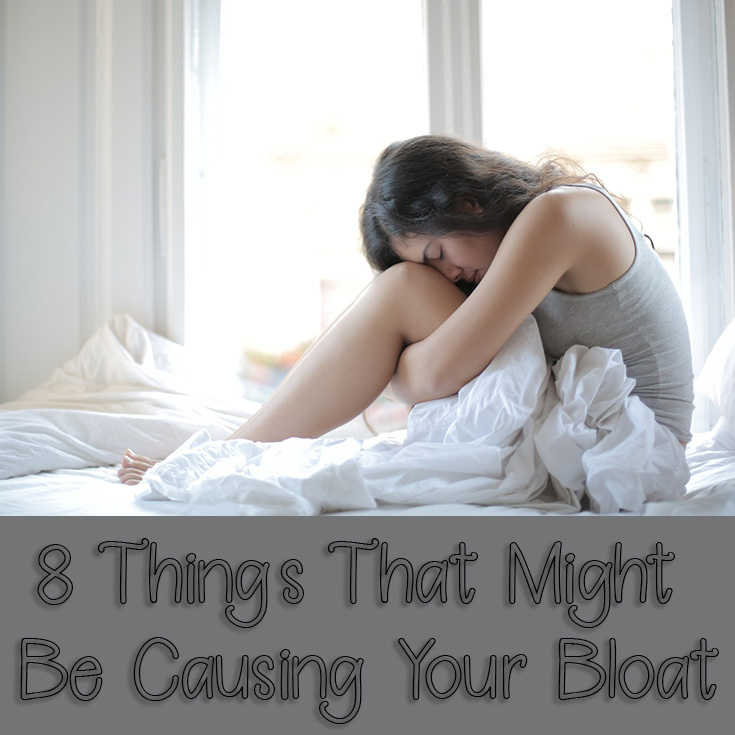Got bloat? Everyone does at one point or another, but where does that too-full feeling come from? Is it karma, something you ate or an underlying condition that’s just now flaring up? Luckily, you can narrow down the possibilities and determine what might be causing your bloat. That way you can find relief and get back to enjoying life without a puffy tummy.

1. Digestive Disorders
Many stomach issues, including bloating, may be a result of common digestive disorders like irritable bowel syndrome and SIBO. IBS can even develop as a result of SIBO, and both can cause bloating, diarrhea and constipation. Long-term conditions like GERD are more difficult to treat and can lead to other complications like acid reflux and even vomiting. Therefore, it’s wise to consult your doctor if you experience severe symptoms or ongoing complications.
2. Celiac Disease
Some people consider celiac a digestive disorder, but it’s actually an autoimmune condition, so it earns its own spot on this list. Celiac disease causes the body to attack the intestinal lining whenever you consume gluten. If left untreated, you may experience long-term abdominal pain, nausea, bloating and more. In this case, you should stop eating foods that contain gluten to minimize symptoms. Read nutrition labels and ingredients lists or shop the gluten-free section to find safe foods for your kitchen.
3. Hormonal Changes
Hormone fluctuations — like those you experience during menstruation and perimenopause — can cause cyclical bloating that leaves you feeling nauseous and uncomfortable. Sometimes, the bloat appears as gas buildup. Other times, it’s fluids or digestive backup that cause issues. Estrogen receptors in your GI tract can also affect your visceral sensitivity and make you feel bloated even if you’re not. Talk to your gynecologist to determine whether birth control or diuretics may help alleviate these and other symptoms.
4. Inflammation
Peptic ulcers, alcohol and bacterial infections like H pylori can irritate your stomach lining and cause gastritis, otherwise known as stomach inflammation. When this happens, you may experience pain, constipation, diarrhea and bloating. However, you may experience more serious symptoms if you also have an inflammatory disease like diverticulosis or Crohn’s disease. While diet and exercise may alleviate symptoms, these conditions may require antibiotics and other medications to effectively reduce bloating.
5. Salt Intake
Your body needs salt to maintain a healthy blood pressure and promote muscle function. However, most Americans consume way too much by eating prepackaged and fast foods. Eventually, a high-sodium diet can lead to water retention and, ultimately, bloating. Therefore, it’s important to avoid processed foods and read food labels to monitor your sodium intake. Generally, you should steer clear of canned soups, frozen meals and cured meats to shed the water weight and the pudgy tummy.
6. FODMAPs
Broccoli and beans are healthy, right? So why do they make you feel so bloated? These foods contain FODMAPs, types of carbohydrates that can cause digestive problems like gas, stomach pain and irregular bowel movements. Your body has trouble digesting these short-chain carbs, so your gut bacteria use them for fuel instead, which can produce hydrogen gas and draw liquid into your intestine. Common FODMAPs include lactose, fructose, fructans, polyols and galactans, which are found in most legumes.
7. Carbonated Beverages
Pouring yourself a glass of bubbly — whether it be soda or champagne — can easily inflate your stomach. These drinks are filled with gas, which ultimately ends up in your digestive system. Sure, you may burp some of it away but, once the gas reaches your intestines, it’ll stay there until you pass it. Seltzers, beer and other soft drinks also contain plenty of sugar, a FODMAP that can cause water retention and bloating.
8. Overeating
You know that eating too fast can give you hiccups and bloat, but what about eating too much? Filling your plate — and your belly — with excessive amounts of food can stretch your stomach and easily give you that too-full feeling. Because it takes about 20 minutes to start feeling satiated, you can alleviate symptoms by eating slowly and consuming the healthiest items on your plate first. That way, if you run out of room, you’ll still have eaten the most nutritious foods on your plate.
Prevent and Relieve Bloating
Bloating can be painful and debilitating, even if it doesn’t cause a swollen belly. Whether you’re dealing with constipation, diarrhea or something in between, the condition can be incredibly uncomfortable. Luckily, you can effectively prevent and relieve bloating, even if it’s a recurring or long-term issue.
Drink more water and gradually add more fiber to your diet to keep things moving and increase satiation. Avoid processed foods, up your exercise routine and start a food journal to document sensitivities and potential allergies. If symptoms persist, consult your doctor for advice or medical treatment. They’ll often recommend peppermint oil, teas, antacids, probiotics and supplements before prescribing medications or a specific diet.






Speak Your Mind